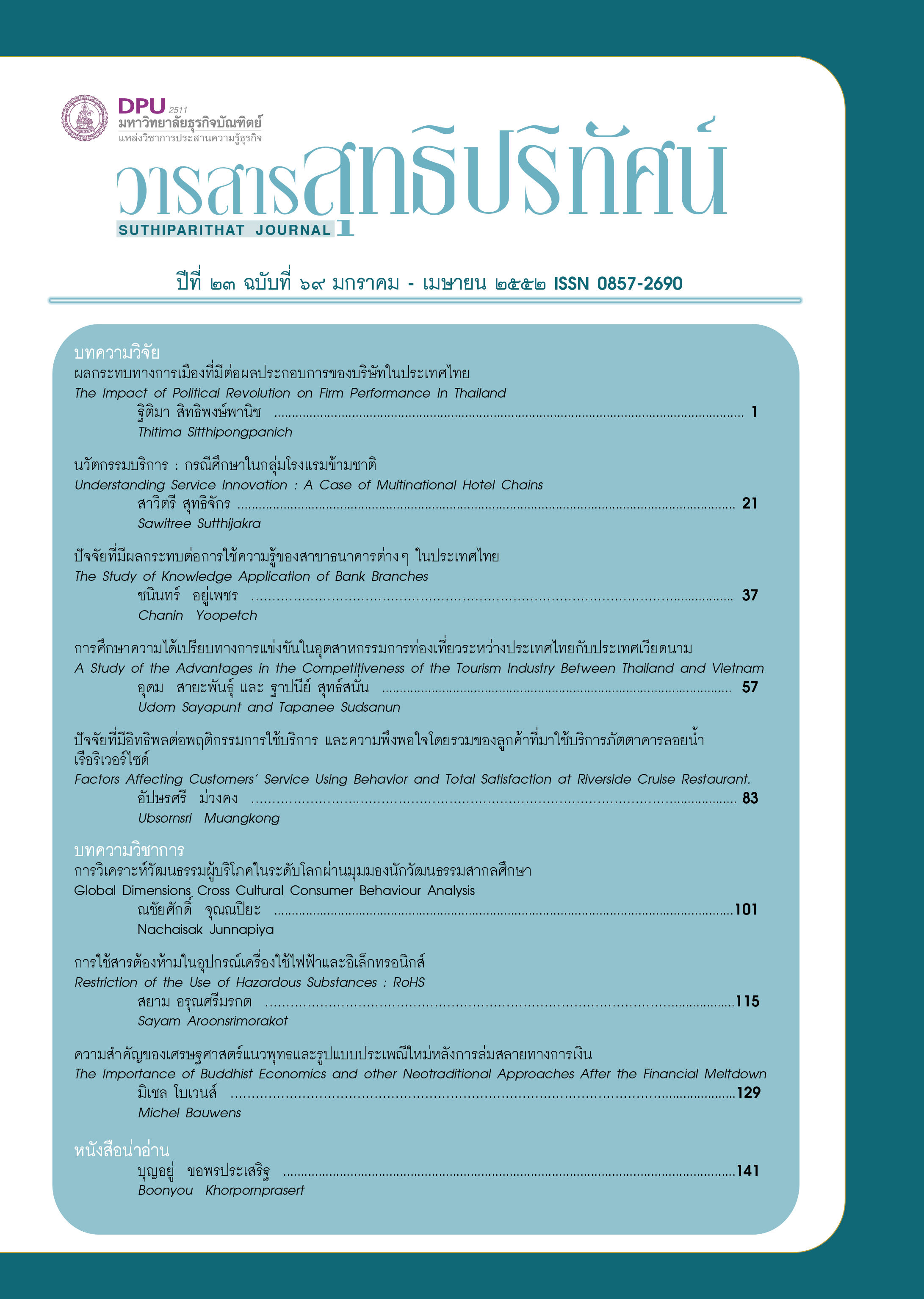ผลกระทบทางการเมืองที่มีต่อผลประกอบการของบริษัทในประเทศไทย
คำสำคัญ:
ความสัมพันธ์ทางการเมือง, ผลประกอบการของบริษัท, และประเทศไทยบทคัดย่อ
งานวิจัยนี้ได้ทำการศึกษาผลกระทบของความสัมพันธ์ทางการเมืองภายใต้ลักษณะของการถือหุ้นแบบกระจุกตัว บริษัทของครอบครัว และการบังคับใช้กฎหมายที่ยังไม่ค่อยเข้มงวดในประเทศไทย โดยใช้การวิเคราะห์จากกลุ่มตัวอย่างขนาดใหญ่ตั้งแต่ปี 2541 ถึง 2550 ซึ่งแบ่งเป็น 3 ช่วงเวลาได้แก่ ก่อนการเลือกตั้ง (2541-2543) การแต่งตั้ง ดร.ทักษิณ ชินวัตร เป็นนายกรัฐมนตรี (2544-2547) และช่วงตกต่ำทางการเมืองถึงเหตุการณ์ปฏิวัติ (2548-2550) ในงานวิจัยนี้ได้ให้คำจำกัดความของบริษัทที่มีความสัมพันธ์ทางการเมืองว่า เป็นบริษัทที่มีสมาชิกในครอบครัวของนายกรัฐมนตรีทักษิณ ชินวัตร สมาชิกในครอบครัวของรัฐมนตรีในรัฐบาลนายกรัฐมนตรีทักษิณ ชินวัตรระหว่างปี 2544-2547 สมาชิกในครอบครัวของสมาชิกพรรคไทยรักไทย หรือสมาชิกในครอบครัวของผู้บริจาคเงินให้พรรคไทยรักไทยเป็นผู้ถือหุ้นรายใหญ่ของบริษัท ผลวิจัยได้แสดงว่าอัตราส่วนกำไรต่อสินทรัพย์ที่ปรับค่าเฉลี่ยอุตสาหกรรมระหว่างบริษัทที่มีความสัมพันธ์ทางการเมืองและไม่มีความสัมพันธ์ทางการเมืองมีความแตกต่างกันระหว่างปี 2547 (ปีรุ่งเรืองของรัฐบาลนายกรัฐมนตรี ทักษิณ ชินวัตร) และปี 2550 (หลังปีเหตุการณ์ปฏิวัติ) และบริษัทที่มีความสัมพันธ์ทางการเมืองมี อัตราผลตอบแทนที่เกินปกติสะสมกันน้อยกว่าบริษัทที่ไม่มีความสัมพันธ์ทางการเมืองในปีที่เกิดเหตุการณ์ปฏิวัติ 2549 ผลวิจัยดังกล่าวตีความได้ว่า ความสัมพันธ์ทางการเมืองมีความสำคัญต่อผลประกอบการของบริษัท และถ้าบริษัทต้องสูญเสียความสัมพันธ์ทาง การเมืองจะทำให้ผลประกอบการของบริษัทนั้นลดลง
เอกสารอ้างอิง
Anderson, R. C. and Reeb, D. M., 2 0 0 3 . Founding-Family Ownership and Firm Performance: Evidence from the S&P 500. Journal of Finance, 58 (3), 1301-1328.
Barber, B. M. and Lyon, J. D., 1996. Detecting abnormal operating performance: The empirical power and specification of test statistics. Journal of Financial Economics, 41 (3), 359-399.
Barber, B. M. and Lyon, J. D., 1997. Detecting long-run abnormal stock returns: The empirical power and specification of test statistics. Journal of Financial Economics, 43 (3), 341-372.
Bunkanwanich, P. and Wiwattanakantang, Y., 2008. Big Business Owners in Politics. Review of Financial Studies, forthcoming.
Clegg, S., Redding, S. G. and Cartner, M., 1 9 90 . Capitalism in contrasting cultures. Berlin: Walter de Gruyter.
Dinc, I. S., 2 0 0 5 . Politicians and banks: Political influences on government-owned banks in emerging markets. Journal of Financial Economics, 77 (2), 453-479.
Faccio, M., 2006. Politically Connected Firms. The American Economic Review, 96 (1), 369-386.
Fisman, R., 2001. Estimating the Value of Political Connections. American Economic Review, 91 (41), 1095-1102.
Ghemawat, P. and Khanna, T., 1998. The nature of diversified business groups: A research design and two case studies. Journal of Industrial Economics, 46 (1), 35-61.
Hellman, J. S., Jones, G. and Kaufmann, D., 2003. Seize the state, seize the day: State capture and influence in transition economies. Journal of Comparative Economics, 31 (4), 751-773.
Johnson, S. and Mitton, T., 2003. Cronyism and capital controls: evidence from Malaysia. Journal of Financial Economics, 67 (2), 351-382.
Khanthavit, A., Polsiri, P. and Wiwattanakantang, Y., 2003. Did families lose or gain control? Thai firms after the East Asian financial crisis. In J. P. H. Fan, H. Masaharu and T. Juro, (eds.), Designing Financial Systems in East Asia and Japan: Toward a Twenty-First Century Paradigm, New York: Routledge, pp. 247-272.
Khwaja, A. I. and Mian, A., 2005. Do Lenders Favor Politically Connected Firms? Rent Provision in an Emerging Financial Market. Quarterly Journal of Economics, 120 (4), 1371-1411.
La Porta, R., Lopez de Silanes, F. and Shleifer, A., 1999. Corporate ownership around the world. Journal of Finance, 54 (2), 471-517.
Morck, R. K., Stangeland, D. A. and Yeung, B., 2000. Inherited Wealth, Corporate Control, and Economic Growth The Canadian Disease? In R. K. Morck, (ed.) Concentrated Corporate Ownership, Chicago: National Bureau of Economic Research Conference Report.
Phipatseritham, K. and Yoshihara, K., 1983. Business groups in Thailand. Institute of Southeast Asian Studies, Research Notes and Discussion Paper no. 41.
Polsiri, P. and Wiwattanakantang, Y., 2003. Business Groups in Thailand: Before and after the East Asian Financial Crisis. Working Paper, Hitotsubashi University.
Siegel, J., 2 0 0 5 . Contingent Political Capital and International Alliances: Evidence from South Korea. Administrative Science Quarterly, 52 (4), 621 - 666.
Suehiro, A., 1989. Capital accumulation in Thailand, 1855-1985. Tokyo: Centre for East Asian Cultural Studies.
Tangkitvanich, S., 2004. Political connections and returns from the Thai stock market. In C. Pinthong, (ed.) Knowing Thaksin 2 (Roo Tun Thaksin 2), in Thai. Vol. 1, Bangkok: Kor Kid Duay Kon, pp. 99-111.
White, H., 1980. A heteroskedasticity-consistent covariance matrix estimator and a direct test for
heteroskedasticity. Econometrica, 48 (4), 817-839.
Wooldridge, J. M., 2003. Introductory econometrics : a modern approach. Mason, Ohio: Thomson/ South-Western.
ดาวน์โหลด
เผยแพร่แล้ว
รูปแบบการอ้างอิง
ฉบับ
ประเภทบทความ
สัญญาอนุญาต
เนื้อหาและข้อมูลในบทความที่ลงตีพิมพ์ในวารสารสุทธิปริทัศน์ ถือเป็นข้อคิดเห็นและความรับผิดชอบของผู้เขียนบทความโดยตรงซึ่งกองบรรณาธิการวารสาร ไม่จำเป็นต้องเห็นด้วย หรือร่วมรับผิดชอบใด ๆ
บทความ ข้อมูล เนื้อหา รูปภาพ ฯลฯ ที่ได้รับการตีพิมพ์ในวารสารสุทธิปริทัศน์ ถือเป็นลิขสิทธิ์ของวารสารสุทธิปริทัศน์หากบุคคลหรือหน่วยงานใดต้องการนำทั้งหมดหรือส่วนหนึ่งส่วนใดไปเผยแพร่ต่อหรือเพื่อกระทำการใด ๆ จะต้องได้รับอนุญาตเป็นลายลักษณ์อักษรจากวารสารสุทธิปริทัศน์ก่อนเท่านั้น







